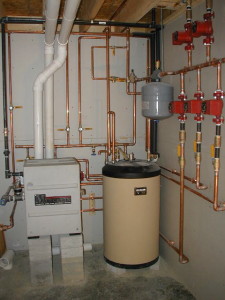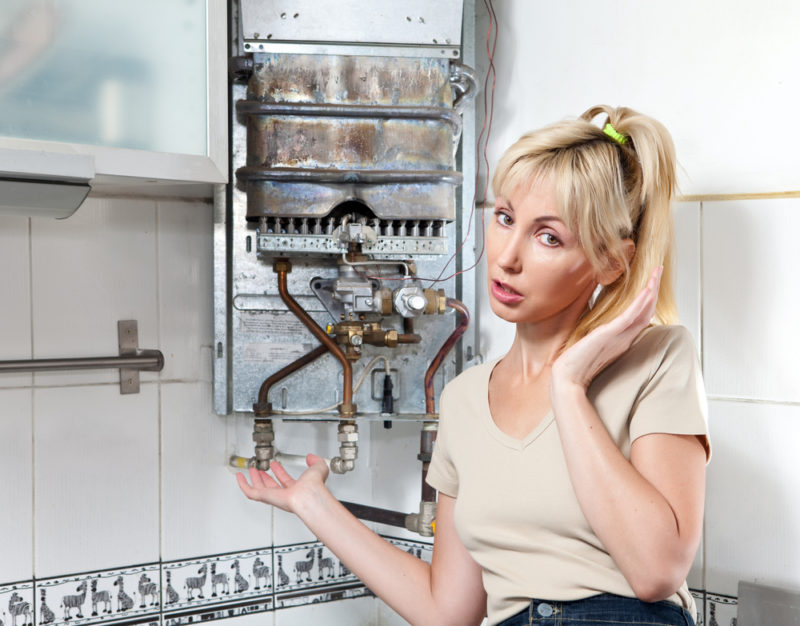We've encountered this great article involving How to Avoid a Broken Hot Water Heater directly below on the internet and reckoned it made good sense to share it with you over here.

Whether it is located in the cellar or a separate room, damaged hot water heater can cause stress and anxiety. A basic device holds 80 gallons, so an overnight leak will certainly lead to a flooding. This results in significant property damage with drenched wall surfaces and also floorings. Besides, having no hot water supply is also frustrating. If you are dealing with these concerns, keep in mind of the following:
Shut Off Source Of Power
Before calling the plumber, shut off a gas water heater by transforming the temperature level dial. This is usually located on top of the thermostat. If you have a model that operates on electric power, switch off the breaker. This will certainly protect against electrocution, especially if there is a leakage as water is a conductor. Normally, the heating element turns off when the water hits a specific temperature level. But with a broken storage tank, it might malfunction. Sufficing off ensures you remain secure.
Cut Off the Cold Water Supply
Cut off the storage tanks tap water supply from the resource. This goes from your major water line right into the tank. When your storage tank remains in good condition, the cold water quits filling when the storage tank is complete. Because it is leaking, the water will certainly proceed to flow. Close the valve found at the top of the heater. Turn this clockwise to close it off. You need to transform off that primary water supply line outside your residential or commercial property if you can not discover it or reach it.
Call the Plumber
After doing the very first two security actions, you should call your plumber to come as soon as possible to repair a fractured water heater. Nonetheless, remember that your device will certainly not simply conk out substantially overnight. There are normally indications that your aging water heater has sediment build-up in the inside. Take note of the following:
Instead, as soon as you detect these indications, have a professional come to evaluate your water heating system say thanks to. Typically, water heating units have a lifespan of concerning 8 to 12 years.
Clean Up Home
After calling the plumber, file damage by bearing in mind as well as pictures so you can assert your property owner's insurance. From there, start the instant clean-up. Obtain any important items to prevent more saturating. Then, remove any type of standing water to avoid mold and mildew and mildew development. If you have a submersible water pump, make use of that to drain pipes the water. Or else, the conventional bucket technique will additionally work. Try to mop out everything, including baseboards and also walls. Maintain them running to keep air distributing if you have an electric fan and dehumidifier. This will certainly assist hinder mold and mildew growth.
Remember, if you discover any type of issues with your hot water heater, call the pros immediately. You can not take this trouble lightly due to the fact that a damaged thermostat can elevate water temperature to a dangerously high degree, causing unintentional burns. A broken heating unit stress safety valve can also cause a surge. For finest outcomes, obtain an annual check so your device obtains examined, cleaned up, drained pipes, as well as filled up, assuring ideal efficiency.
Whether it is situated in the cellar or a different area, damaged water heating systems can cause anxiety. Before calling the plumber, shut off a gas water heating unit by turning the temperature level dial. After doing the very first 2 safety steps, you have to call your plumber to come right away to repair a burst water heating unit. If you have a submersible water pump, use that to drain the water. Bear in mind, if you notice any kind of issues with your water heating unit, call the pros right away.
Is My Water Heater Broken?
The Water Heater is Old
No appliance will last forever. This includes a home’s water heater. During its lifespan, residents are going to face a situation where a new water heater installation will be necessary. The biggest problem with this is that most people are not sure when their water heater expires. Not knowing this can lead to serious risks if the unit begins to act up due to old age.
Most makes and models of water heaters will last between eight and 10 years. While 10 years is the age when water heater replacement is highly recommended, the need to replace the unit may occur before this time or after. If the unit doesn’t show any symptoms of a problem, it is a good idea to replace it at the 10-year mark (from the manufacture date).
Some of the symptoms that indicate a new unit is needed include rusting, leaks, noises, and a failure to heat up the water. Also, note that not all units have a 10-year life expectancy. The main exception to this rule is that a gas unit will last for six to eight years.
Rusty Heater Inlet Valve or Water
While steel is the strongest material on earth, it does have a weakness – rust. If corrosion occurs on a steel surface, it will begin to spread and eat through the steel in certain areas. On water tanks and pipes that are made of steel, rust is a warning sign of an impending leak.
The issue for many is trying to figure out if the rust is coming from the water heater or the pipes that lead to the faucet. If rust is seen, it is a clear indication that water heater service from the professionals is needed.
If rusty water appears out of the faucets in the bathtub or sink, it likely means a rusty water heater. If there is rust near the water inlet or the pressure relief valve, rust has likely developed inside the tank. If tap water appears rusty, it may be an issue with the pipes.
Strange Sounds from the Water Heater
Are there strange sounds coming from the tank? As a water heater gets older, rumbling noises may develop and get louder and louder as the water in the tank heats up. In homes where large amounts of hot water are used, the issue is likely going to be even more obvious when more serious issues arise. If there is a strange or loud noise coming from the unit, it is probably because of sediment buildup. A good way to remedy this problem is by flushing the heater. If this does not work, then a new unit may need to be installed.
Leaks
As a water heater gets closer to the end of its useful life, there is a higher chance there will be water around the tank. If there is water, this usually means leaks are occurring. Based on where the unit is located in the home, a leak may result in serious property damage.
Leaks are usually caused by expansions in the metal tank. The expansions occur as time passes and as the inside body of the tank is exposed to multiple heating cycles per day. When a fracture forms, the gap will be slight enough to hold the water in; however, in more serious situations, this will not be the case. If the tank is idle, the water will not leak but when the metal expands during each heating system, small amounts of water will get through the gap.

I was made aware of that editorial on Broken Water Heaters through a good friend on a different web address. Those who liked our post kindly don't forget to pass it around. Thanks a lot for your time spent reading it.
Additional Information